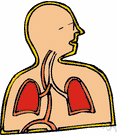respiratory system
n.
The system of organs and structures, such as lungs in mammals and gills in fish, involved in the exchange of oxygen and carbon dioxide between an organism and its environment.
American Heritage® Dictionary of the English Language, Fifth Edition. Copyright © 2016 by Houghton Mifflin Harcourt Publishing Company. Published by Houghton Mifflin Harcourt Publishing Company. All rights reserved.
respiratory system
n
(Anatomy) the specialized organs, collectively, concerned with external respiration: in humans and other mammals it includes the trachea, bronchi, bronchioles, lungs, and diaphragm
Collins English Dictionary – Complete and Unabridged, 12th Edition 2014 © HarperCollins Publishers 1991, 1994, 1998, 2000, 2003, 2006, 2007, 2009, 2011, 2014
res′piratory sys`tem
n.
the system of organs and tissues involved in drawing oxygen into the body and removing carbon dioxide: in mammals, includes the nasal cavity, pharynx, trachea, bronchi, lungs, and the diaphragm.
[1935–40]
Random House Kernerman Webster's College Dictionary, © 2010 K Dictionaries Ltd. Copyright 2005, 1997, 1991 by Random House, Inc. All rights reserved.
res·pi·ra·to·ry system
(rĕs′pər-ə-tôr′ē) The system of organs and structures in which gas exchange takes place, consisting of the lungs and airways in air-breathing vertebrates, gills in fish and many invertebrates, the outer covering of the body in worms, and specialized air ducts in insects.
The American Heritage® Student Science Dictionary, Second Edition. Copyright © 2014 by Houghton Mifflin Harcourt Publishing Company. Published by Houghton Mifflin Harcourt Publishing Company. All rights reserved.
respiratory system
In humans, the mouth, nose, pharynx, larynx, trachea, bronchi, bronchioles, alveoli, and lungs.
Dictionary of Unfamiliar Words by Diagram Group Copyright © 2008 by Diagram Visual Information Limited
ThesaurusAntonymsRelated WordsSynonymsLegend:
| Noun | 1. |  respiratory system - the system for taking in oxygen and giving off carbon dioxide; in terrestrial animals this is accomplished by breathing respiratory system - the system for taking in oxygen and giving off carbon dioxide; in terrestrial animals this is accomplished by breathingbody, organic structure, physical structure - the entire structure of an organism (an animal, plant, or human being); "he felt as if his whole body were on fire" system - a group of physiologically or anatomically related organs or parts; "the body has a system of organs for digestion" respiratory tract, airway - the passages through which air enters and leaves the body respiratory organ - any organ involved in the process of respiration trachea - one of the tubules forming the respiratory system of most insects and many arachnids |
Based on WordNet 3.0, Farlex clipart collection. © 2003-2012 Princeton University, Farlex Inc.

